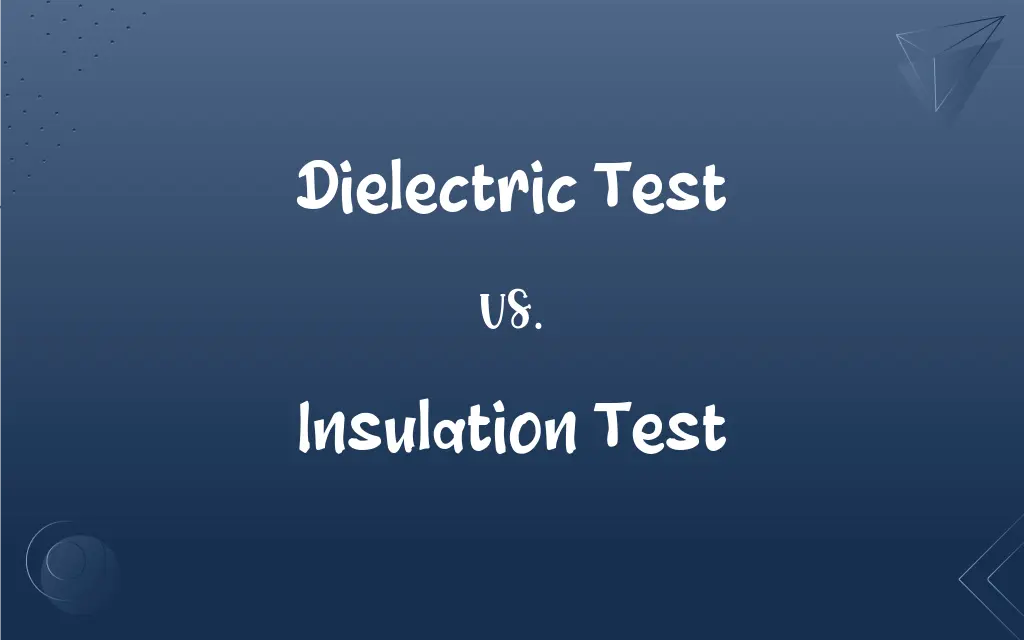Dielectric Test vs. Insulation Test: What's the Difference?
Edited by Janet White || By Harlon Moss || Published on February 10, 2024
Dielectric testing assesses a material's ability to act as an electrical insulator, while insulation testing measures the integrity of insulation in electrical systems.

Key Differences
Dielectric tests evaluate the ability of a material to insulate and withstand electrical stress without conducting. Insulation tests, however, measure the effectiveness of insulation in electrical systems, checking for degradation or faults.
In a dielectric test, high voltage is applied to the material to test its dielectric strength and insulating properties. An insulation test involves applying voltage to an electrical system to assess the insulation resistance, usually with a megohmmeter.
Dielectric tests are crucial in ensuring material quality in manufacturing and research. Insulation tests are typically performed in maintenance and safety checks of electrical installations and equipment.
Dielectric testing is key for safety certification of electrical components, ensuring they can handle specified voltages. Insulation testing ensures that electrical systems are safe for use and comply with industry standards.
Results from dielectric tests indicate the maximum voltage a material can withstand. Insulation test results reveal the resistance level of the system's insulation, indicating its condition and safety.
ADVERTISEMENT
Comparison Chart
Primary Purpose
Assessing dielectric strength of materials.
Measuring insulation resistance in systems.
Method of Testing
Applying high voltage to test insulating properties.
Applying voltage to evaluate insulation condition.
Typical Applications
Material manufacturing, component testing.
Electrical system maintenance, safety checks.
Safety and Compliance Focus
Ensuring materials can withstand electrical stress.
Checking system integrity and compliance.
Result Interpretation
Maximum voltage material can endure without failure.
Resistance level, indicating insulation health.
ADVERTISEMENT
Dielectric Test and Insulation Test Definitions
Dielectric Test
An assessment of a material's dielectric strength under stress.
The cable underwent a dielectric test to ensure its performance in the electrical grid.
Insulation Test
Measuring the effectiveness of electrical insulation under operational conditions.
The insulation test was critical in the maintenance of the power plant.
Dielectric Test
Measuring a material's capacity to resist electric breakdown.
The dielectric test was crucial for the safety certification of the new insulators.
Insulation Test
A diagnostic tool for preventive maintenance in electrical circuits.
Regular insulation tests help in preventing unexpected system failures.
Dielectric Test
A test for evaluating the insulating properties of electrical components.
Each capacitor was subjected to a dielectric test before shipment.
Insulation Test
An evaluation to detect faults or degradation in electrical insulation.
They conducted an insulation test after the system showed signs of aging.
Dielectric Test
An analysis to determine the voltage threshold of insulating materials.
The dielectric test helped in selecting the right material for the transformer.
Insulation Test
A test measuring the resistance of insulation in electrical systems.
The insulation test indicated the wiring was still in good condition.
Dielectric Test
A test to evaluate the electrical insulating ability of a material.
The dielectric test confirmed the polymer's suitability for high-voltage applications.
Insulation Test
A safety test for assessing the integrity of electrical installations.
The annual insulation test is part of our routine safety protocol.
FAQs
Why is dielectric testing important?
It ensures materials can safely withstand high voltage.
How is a dielectric test performed?
By applying high voltage to a material and measuring its insulating response.
What is a dielectric test?
A test to assess a material's electrical insulating capabilities.
What industries rely on dielectric testing?
Electrical, aerospace, automotive, and manufacturing industries.
What does an insulation test reveal?
The health and integrity of a system's electrical insulation.
What is an insulation test?
A measurement of insulation resistance in electrical systems.
What equipment is used in insulation testing?
Typically, a megohmmeter is used for insulation testing.
Is insulation testing necessary for home electrical systems?
Yes, especially in older homes to ensure safety.
Can insulation tests detect all types of faults?
They are effective in detecting many faults, but not all.
Does dielectric strength vary with material?
Yes, different materials have varying dielectric strengths.
What is the significance of dielectric breakdown?
It indicates the point where material starts to conduct electricity.
Do insulation tests require system shutdown?
Yes, for safety and accuracy, systems are often de-energized.
Can dielectric testing prevent electrical failures?
Yes, it helps in selecting materials that resist electrical breakdown.
What factors affect insulation test results?
Temperature, humidity, and the age of the system can affect results.
Are dielectric tests destructive?
They can be, especially if the material fails the test.
Can regular testing improve electrical system longevity?
Yes, by identifying and addressing issues early.
How often should insulation tests be conducted?
Regularly, depending on the industry standards and system usage.
What is the main difference in results between these tests?
Dielectric tests measure maximum voltage capacity; insulation tests measure resistance levels.
Can these tests be performed on-site?
Yes, with portable testing equipment.
Are there international standards for these tests?
Yes, various standards apply, depending on the application.
About Author
Written by
Harlon MossHarlon is a seasoned quality moderator and accomplished content writer for Difference Wiki. An alumnus of the prestigious University of California, he earned his degree in Computer Science. Leveraging his academic background, Harlon brings a meticulous and informed perspective to his work, ensuring content accuracy and excellence.
Edited by
Janet WhiteJanet White has been an esteemed writer and blogger for Difference Wiki. Holding a Master's degree in Science and Medical Journalism from the prestigious Boston University, she has consistently demonstrated her expertise and passion for her field. When she's not immersed in her work, Janet relishes her time exercising, delving into a good book, and cherishing moments with friends and family.































































